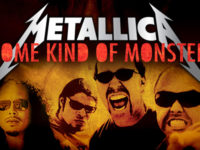When I first heard Metallica’s St. Anger, I lamented the death of a band I grew up with, reeled from hearing that horrible snare that Lars Ulrich was using, made fun of James Hetfield’s weak singing, and poked at the plodding rhythms and overlong songs.
But after spending several days with a set of mp3s ripped from the commercial release (a fact which would send Lars into convulsions), I found that this gamely, unlovely new Metallica sound had wedged itself in all the odd spaces in my brain I reserve for those things which I inexplicably love – like the Shaggs.
Released on June 5, 2003, St. Anger is overlong. It’s overdone, it’s cheesy in spots, and yes, it doesn’t measure up to the Metallica of the past. I kept hearing that horrible snare, like someone banging a metal spoon on the back of a copper pot and that odd, almost out-of-tune guitar that opens the album and the song “Frantic” – and Hetfield’s cloying play on the last syllable of that word (“frantic, tic, tic, tic, tic … tic toc”).
Yet St. Anger pleases much more than either of the Load albums did – two spotty releases that if edited and combined would have probably made one quite good LP.
What got me was that I felt that I was giving in to the anti-hype. As bad as falling for the hype that comes out with a major release is instead falling victim to the unavoidable anti-hype. For every rave review, there is an uncountable number of “long-time fans” who fight back, armed with examples of past greatness from the band’s back catalog to refute any claims of high moments. It’s so easy to join into that — so easy to be negative, and it’s fun, too.
Metallica had made fools of themselves over the previous eight years or so, adopting the oh-so-alternative look by getting piercings in weird places, wearing dark eye makeup, and, of course, cutting the long metal-head hair – then savagely attacking fans who downloaded the music. It’s easy to let those political and stylistic choices affect your feelings about a band. But as a self-appointed music critic, it’s not my job to take the easy route.
I put aside my distaste for Metallica’s occasional behaviors, put aside my memories of … And Justice For All and Master of Puppets, and attempted to listen to St. Anger as if I’d never heard this band before, as if they had no past to live up to. After all, the past is a double-edged sword: The past carries along with it fans, and fans have expectations. While a band can look back at those career- and even genre-defining moments with pride, as Metallica can, the fans will use those same moments as if they were an albatross around the band’s neck.
“Fans” very often prevent a band from truly progressing, as they will often be fickle and simply not respond: A good example would be Def Leppard’s Slang, a mature change of pace that contained few of the indulgent examples the band was so known for in the 1980s. Fans balked, sales slumped, even while critics raved and praised the grown-up style. By the next album, Def Leppard was churning out songs filled with riffs lifted right out of their old hits. Fans loved it.
There are moments when a band does something truly perplexing, as when Metallica released Load and Reload, because it was uncertain who the band was appealing to. Metallica had a bit of a mid-life crisis, attempting to cash in on current trends in a way that didn’t appear at all convincing. The changes were so sudden that the band understandably upset a large number of very loyal fans. Remember that albatross, because this is when it was hung around the band’s neck.
For every kind word about songs like “King Nothing,” “Fuel,” “Fixxxer,” etc., fans would happily fling out duds like “Mama Said” in retaliation. The two albums, while certainly not classics, are unfairly judged by this period where upset fans took out their frustrations.
Like I said, had Metallica been logical and cut out the dull, questionable material, these two shaky LPs could have been combined into one solid follow-up to the multi-multi-platinum self-titled album. Instead, their catalog is marred by not one, but two flawed albums issued in quick succession.
Is it possible to regain your former status after the flogging they received? If so, Metallica did nothing to help themselves by issuing an orchestral album (S&M) and a two-disc set of covers in the form of Garage, Inc. – always the death knell of any band. (And yes, I do realize that much of it is a much-needed reissue of the legendary Garage Days EP. Regardless, a covers album signals creative death, a desperate, scraping-the-bottom-of-the-barrel move to get a few more big hits under their belt before disbanding.)
Hopes were understandably high when news arrived that Metallica would soon release a new album, claimed by members themselves as the heaviest thing they’d done in 10 years or more. Could it possibly live up to that kind of hype? Metallica builds its own hype now, untended by record company PR. Fans were eagerly hoping for a Master 2 or the Justice follow-up, and not another Load by any means – and the band did everything but promise it outright. So, obviously, when any new LP arrives, fans practically riot because Metallica will never reach those heights again. Whatever magic a band possesses in its peak burns out, fades away, turns to dust – name your cliche – and it will never return in the same form.
Bands turn corners, and the Black Album was that important corner for Metallica. By writing more conventional song structures, by incorporating more catchy choruses, the band fundamentally altered the very fabric of what makes up the Metallica sound. Like riding a bike, it’s simply impossible to not do it once you’ve gotten the hang of it. (Have you ever tried to ride badly, like you did the first time you sat on one? Try it and see what I mean.)
The easiest thing a band can do is re-address what they’ve done in the past, rewrite those old songs with slightly different melodies and new lyrics. (That’s what Iron Maiden did with Brave New World, after all.) Or they can try to do something completely different, and that’s what Metallica did.
Oh, sure, some trademark riffs were noticeable here and there, but essentially the band’s sound on St. Anger was all new, and as such I had to listen to this as if the band was new to me too. What I heard was not especially groundbreaking, but an aggressive, honest assault that was straining to free itself of the past while doing the very things Metallica knows the fans love about them. So there were no ballads, no Southern rock anthems, no Marianne Faithful.
Lars Ulrich laid it on thick with his double-kick drums, and fast, heavy riffs abound. But the band was still writing songs rather than epics, and the compromise was made by limiting the scope of each song. They may have played on and on – I did say much of this album is overlong, didn’t I? – but they didn’t stray very far from where they started out on each track.
There were very few tracks that really needed to go on the seven and eight minutes they do, and more often than not, it was the shorter (5+ minute) tracks that worked the best. As with the double Load offerings, there was simply too much here. Judicious use of fades and the delete button in the studio would have strengthened songs like “Invisible Kid” and “Shoot Me Again” (which had one of the most annoyingly repetitive choruses I’ve heard in a long while).
Still, there were more than enough moments where Ulrich was pummeling his drums like he used to, where James Hetfield and Kirk Hammett were flailing at their guitars, to invoke some of the old feelings Metallica stamped into you when you first heard them.
It’s still not perfect: Hetfield’s singing is not a highlight by any means (where is that growl we all loved so much, James?), and there’s nary a guitar solo out of Kirk Hammett to be found. But if you give it an honest second chance, St. Anger might just work its way into you like their old material did. It may not resurrect the scary despair Master of Puppets could, but it also won’t leave you cold like Load and Reload.
Most of all, it sounded like the band was trying for the first time in a long time – and that was enough for me. (Oh, and Lars, if it wasn’t for those mp3s you so hate, I wouldn’t have bought St. Anger at all.)
- King Crimson’s Brief But Important Double-Trio Era Peaked With ‘Thrak’ - April 14, 2025
- How David Bowie’s ‘Reality’ Stood Out For What It Was Not - September 29, 2023
- Metallica’s ‘St. Anger’ Was Always Much Better Than They Said - June 8, 2023





I honestly enjoyed St.Anger It was angry, it was exhausting. I know people dont like it, because its not Puppets or Lightning, or KIll Em All, But people are just ignorant they live in the past with Metallica, Yeah I love old school Metallica, those albums leading up to the Black Record are amazing. The black record is amazing as well, but the band (or A Band) Changes through time, if you dont like an album, dont listen to it. Its your choices its not like youre getting asked to listen to it, or you will burn in hell. I love Load/ReLoad, they were experimenting, it worked didnt it?? If yall dont like it, dont listen to it, does everyone just bash bands nowadays? does anyone have respect for people who do this anymore? Its called freedom, youre allowed to do anything your heart desires in this world, and we have people who bash bands for it? Wow. Rant over.